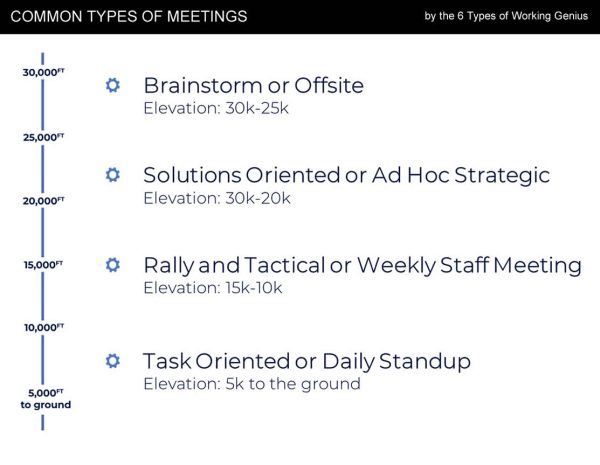Many of us spend a lot of time in meetings. In fact, meetings may be the most important part of the work we do.
It is where we have important conversations, share ideas, plan our work, make decisions, build team relationships, and decide how to get work done.
Or not?
Some of us have also experienced meetings that severely lacked productivity and effectiveness, where no decisions are made, team members walk away frustrated, and everyone wonders if the meeting was just a waste of precious time.
As a leader, it is tempting to throw every sort of issue that needs to be talked about into one long, unproductive meeting – like a bad stew with too many ingredients. Put simply, is the lazy way of leading meetings and sets the team up for frustration and low productivity.
For people who dread meetings, one of my favorite tools to recommend is “The Six Types of Working Genius” because of its effectiveness at transforming meetings. In short, The Working Genius is a framework to improve productivity at work and get more done, especially in meetings. Here are three tips to master the art of meetings with Working Genius:
Determine the type of meeting needed.
Working Genius identifies four types of meetings with different objectives appropriate for each stage of work. As leaders, we must learn to recognize, value, and initiate different types of meetings to lead our team in productivity.
The following descriptions are partially excerpted from The Table Group:
- Brainstorming or Offsite Meeting – This type of meeting is to step back and look at your market or environment. It is where we ask big picture questions like, “Are we solving the right problems?”, “Are we missing something”, “Could we serve our customers better?” These meetings are more conceptual at the highest elevation of work. It plays out a bit like ping-pong between wondering about important questions and inventing new ways of doing things.
- Solutions-Oriented or Strategic Meeting – This meeting is where we identify specific problems and spend time tackling them with a strategic focus. The purpose is to address an issue, design a solution, and take time to tweak it. Here we ask questions like, “What is our focus?”, “How can we tweak our strategy?”, “How can we refine our solution?” This meeting requires invention with plenty of time to push back with concerns and discern the best path forward.
- Rally & Tactical or Weekly Staff Meeting – This meeting is really about inspiring and equipping people to execute. We know our primary objective and we need to get the ball moving. Here we ask questions like, “What do we need to get it done?”, “Who needs to do what?”, “How do we move the ball forward?” This meeting rallies the team around the goals and assesses the resources needed.
- Task Oriented or Daily Tactical Meeting – This is a brief meeting where we get updates on what everyone is working on. We ask questions like “What is everyone working on today?” “What will we get done today?” “What can we check off the list?” This meeting is about prioritizing and allocating resources to get the project to the finish line.

As we can see, different types of meetings have vastly different goals. Mashing all of these into one unorganized or unclarified meeting can result in a lot of frustrating conversation circles. Productivity is improved when the type of meeting is clearly defined.
Learn to regulate your working genius.
As leaders, we tend to make every meeting about our own preferred stage of the project. This is well-intentioned but disorientating. The process of all work has three necessary phases and always defaulting or leading to your area of strength can greatly frustrate the team and initiate confusion. It is important to understand where the team is in the process of work, be aware of your tendencies, and regulate when needed.
For example, some of us are idea machines. We love new inventions and ways of doing things. However, there are times when we have meetings to move a project to the finish line. This meeting is simply not the time to bring a new idea or solution. On the flip side, some of us enjoy moving things to the finish line more than high-level ideating. In these cases, we need to regulate in higher-level meetings, recognizing the value of big-picture questions without immediately pushing for
a decision, action plan, or details.
It can be highly frustrating if a team leader doesn’t regulate in different types of meetings or only values and leads one or two types of meetings. Productivity is improved when leaders recognize their tendencies and regulate for the good of the team.
Let your team know.
After you as a leader have determined the type of meeting and how you can regulate, it is important to get your team on board. The Working Genius assessment and training equips your team to use their own working geniuses, learn to regulate, and be more productive.
After your team knows the meeting framework, you can communicate quickly. This can be as simple as “Today, we plan to brainstorm ideas for Project X, no decision needs to be made we just need to get some possible solutions on the table.” Or during a meeting you may insert, “I appreciate that idea, but this project is in the final stages, so we need to stay focused on our current solution and getting to the finished line. You are welcome to bring your idea to me outside of the meeting
to consider for our next project.” You may be surprised at how your productivity in meetings drastically improves by clarifying and communicating expectations.
My experience with the Working Genius is that I have become better equipped to participate and lead meetings. I can confidently offer my strengths and then regulate when the meetings dip into areas that are not my favorite. At the same time, understanding the process of work has given me a language to keep meetings on track while encouraging teammates to collaborate in their areas of working genius.
Let’s bring clarity and organization to our team meetings!
Think the Working Genius would boost productivity on your team? Take a Working Genius assessment or Get Started with Team Training.



